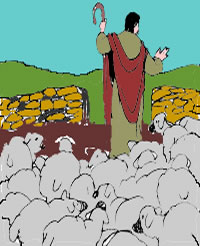
4th Sunday of Easter Year C
The liturgies of the last two Sundays have led us to reflect upon the apostles’ coming to faith on the Risen Lord. As they shared this faith with the first generation of Christians, the image of Jesus as ‘shepherd and guardian’ of God’s people (1 Peter 2:25) established itself in Christian consciousness. One of the Church’s first representations of the Saviour portrayed him as a youthful shepherd with a sheep on his shoulders - no doubt indicating that when they heard the parable of the lost sheep, the first Christians instinctively identified the shepherd of the parable with the Risen Lord.
The image has a long pre-history. In Old Testament times, the peoples of the Middle East, had a old tradition that spoke of a king as ‘shepherd’ of his people. Though these ancient rulers were all too often exploiters of their subjects, this remarkable ideal of humble service lived on in the peoples’ traditions. In the outlook of old Israel, something remarkable occurred when this image was associated with the God of the covenant, the champion of the oppressed - who rebuked the nation’s rulers through his prophet: ‘You have failed to bring back strays or look for the lost … I myself shall take care of my flock’ (Ezekiel 34). This arresting theme is echoed in the psalms, Israel’s confession of faith – in Psalm 99 used in today’s liturgy, and in the familiar Psalm 23.
Against this background, the New Testament passages that speak of Jesus as ‘shepherd’ (‘when the chief shepherd appears, you will be given an unfading crown of glory’, 1 Peter 5:4; ‘the God of peace brought back from the dead our Lord Jesus, the great Shepherd of the sheep’, Hebrews 13: 20) take on a new depth of meaning – a meaning that is fully expressed in today’s short gospel reading from John.
‘The Father and I are one’: with these final words of the fourth gospel’s long and familiar passage on the ‘shepherd’ theme, Jesus makes it clear that, in his role as ‘shepherd’, he identifies himself with the Shepherd who is the God of Israel – full expression of the Father’s being. Because he speaks with the fullness of the divine authority, true believers ‘listen to his voice’; he is the very Author of ‘eternal life’. The first two readings complement this affirmation, by celebrating the universal nature of his flock: before the throne of the one who laid down his life for them are gathered ‘people from every nation, race, tribe and language’; his ‘salvation reaches the ends of the earth’.
How should we live out our faith in the Risen Lord? Let us learn from first generation of Christians who did so by owning him as their ‘Good Shepherd’ – by ‘listening to his voice’ as they pondering all that the great truths of faith offered them, and by living in the hope he brought to the world as he ‘led them to springs of living water’.
John Thornhill sm

